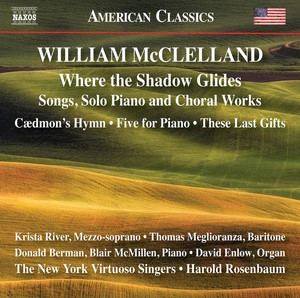
William McClelland (b. 1950)
Where the Shadow Glides
The New York Virtuoso Singers/Harold Rosenbaum
NAXOS 8.559906 [73]
William McClelland is a noted and highly regarded American composer and pianist, and he has developed his wide-ranging style over several decades performing and creating music. A native of Michigan, his recent album is a collection of 23 of his compositions inspired by poems and nature; fourteen songs written for piano and voice, six for solo piano and three for choral presentation. Seven songs are performed by the popular mezzo-soprano Krista River, and eight by the marvelous baritone Thomas Meglioranza, both accompanied by the distinguished pianist Donald Berman. Krista sings one of my favorite numbers on this disc, the beautiful Poem Composed in Sleep, written in 1997. The music was inspired by a love poem that Lidian Emerson wrote to her husband Ralph Waldo Emerson in 1867, the poem coming to her in a dream. Krista’s voice is light and expressive with a superb vibrato, and elegantly matched by Donald’s sensitive accompaniment at a slow walking tempo.
Thomas and Donald collaborate on eight tunes, and one of my favorites is The Politician, a drifting, atonal song inspired by the poem written by Spencer Appling, comparing a politician to a slow-moving crocodile. Another interesting piece is The Defective Record, a song inspired by the poem written by William Carlos Williams, a proponent of the modernism and imagism schools of poetry. Thomas’s voice is big and bold, and Donald carries the energy through the accompaniment with pounding chords and busy arpeggios.
Another pianist, the talented Blair McMillen, gives the premier performance of Five for Piano, a collection of five short numbers for five different poems. June-bug Serenade was composed in 2006, inspired by E.E. Cummings and his poem spring omnipotent goddess thou dost, written in 1920. The song’s dancing melody and giddy rhythm fit nicely with Cummings’s poetic imagery and whimsical use of vocabulary, reflecting on the bright, new world we experience in spring.
The three choral numbers are performed by the New York Virtuoso Singers, conducted by Harold Rosenbaum. The group performs the intriguing Cædmon’s Hymn accompanied by organist David Enlow. Cædmon was an illiterate 7th century shepherd who woke from a dream and through divine inspiration became a monk and religious poet. His only surviving poem is a beautiful nine-line verse in Old English known as Cædmon’s Hymn, which translates as a hymn to God. The song begins with four narrators reciting lines from the original poem in Old English, then are joined by the choir singing colorful, overlapping harmonies ranging from delicate to explosive. David’s organ accompaniment is especially appropriate, well-arranged and inspiring. One of the most moving numbers is These Last Gifts, composed in 2015 and inspired by a poem written by the famous Roman poet Gaius Valerius Catullus around 50 B.C., in which he laments the death of his brother while visiting his gravesite. The piece is sung a cappella, slowly and subdued with broad, rich-textured harmonies highlighted by a single tenor bidding his mournful farewell.
Bruce McCollum
Help us financially by purchasing from



Contents
Cædmon’s Hymn (2018)
Autumnal (2005)
Autumn 1964 (1995)
Going (1993)
Poem Composed in Sleep (1997)
Sea Rose (2002)
Labrador (1990)
Storm (2011)
Hail Lovely and Pure (2011)
Five for Piano (2006)
The Fields of November (2013)
Insomnia (1987)
Memory of Summer Facing West (1975)
The Defective Record (2005)
Snowstorm in the Midwest (1989)
The Politician (1998)
Garden Abstract (2008)
To One Who Revisited an Old Garden (2005)
These Last Gifts (2015)
Other perfomers
Krista River (mezzo-soprano), Thomas Meglioranza (baritone), Donald Berman (piano),
Blair McMillen (piano), David Enlow (organ), Alex Guerrero (tenor)
Robert May, Margaret Dudley, Thomas McCarger, Suzanne Schwing (narrator)



















